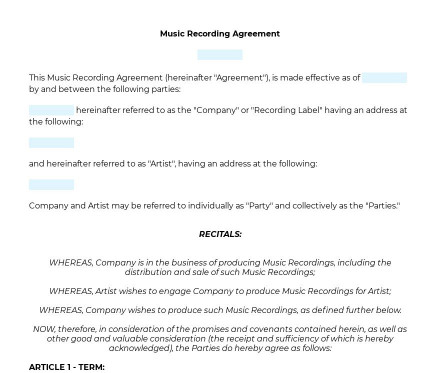Music Recording Contract Free
When one entity, the company (or the record label) agrees to produce musical recordings (for example, an entire album) for another entity, the Artist, this Music Recording Agreement may be used.


 Template Overview
Template Overview
When one entity, the company (or the record label) agrees to produce musical recordings (for example, an entire album) for another entity, the Artist, this Music Recording Agreement may be used. Representatives from both parties can vary, but in most cases, the artist is an individual or a group, and the company is an organized entity. This contract is commonly used by the music industry.
Music Recording Agreements are quite simple, but they are required to contain all of the specifics about parties' relationship. These agreements consist of payment information and musical recording information, such as numbers needed, approvals, and duration.
You fill out a form. The document is created before your eyes as you respond to the questions.
At the end, you receive it in Word and PDF formats. You can modify it and reuse it.
 How to use this template
How to use this template
When two parties want to enter into a music recording agreement, they can use this document. Note that this agreement is also applicable for music videos, not only for music recordings alone.
The document contains information on the names of the parties and their identifying details. You also need to specify recording information, fees, special conditions, and termination information.
A completed document should be printed and signed by both parties. We recommend keeping copies if any future disputes arrive.
 Applicable law
Applicable law
In the US, individual state laws govern Music Recording Agreements and their general commercial contract rules.
Ready to build your document from this template?



 Please wait
Please wait